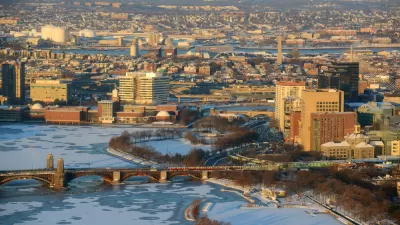It's going to take a lot of funding to build the infrastructure to protect coastal cities from rising seas as climate change takes hold. The city of Boston is starting to experiment with revenue sources that can fund the necessary improvements.

Boston planners are pushing a Climate Resiliency Fund to leverage private development in locations like the city-owned Raymond L. Flynn Marine Park in Seaport for the funding necessary to build protections from rising seas.
According to an article by Andy Rosen, the Climate Resilience Fund is and experiment in infrastructure funding: "asking developers eager to build in the park to help finance a sea wall and other defenses that will protect not just their glimmering new towers of lab space but also the remnants of maritime industry that still operate there."
The Boston Planning & Development Agency is leaning on private sector developers, reports Rosen, to help generate the $124 million needed to construct "the most urgently needed protections for a 191-acre area that in its current state could be prone to flooding as soon as the 2030s and could be largely under water at high tide by the end of the century."
The Climate Resiliency Fund works similarly to how the city "requires commercial developers to contribute a set amount to affordable housing funds, or often to pay for park space or infrastructure upgrades near their projects," according to Rosen.
For more on the city's efforts to prepare for the rising seas of climate change, visit the Climate Ready Boston website, launched on August 9, 2021, lists several initiatives for climate resilience, without mentioning the Climate Resiliency Fund. Rosen's coverage of the Climate Resiliency Fund was published before news that Boston Mayor Kim Janey was rescinding support for the Downtown Harbor Plan championed by the previous mayoral administration.
FULL STORY: Boston is asking developers to help fund a sea wall as the city worries about rising water

Maui's Vacation Rental Debate Turns Ugly
Verbal attacks, misinformation campaigns and fistfights plague a high-stakes debate to convert thousands of vacation rentals into long-term housing.

Planetizen Federal Action Tracker
A weekly monitor of how Trump’s orders and actions are impacting planners and planning in America.

In Urban Planning, AI Prompting Could be the New Design Thinking
Creativity has long been key to great urban design. What if we see AI as our new creative partner?

Chicago’s Ghost Rails
Just beneath the surface of the modern city lie the remnants of its expansive early 20th-century streetcar system.

Baker Creek Pavilion: Blending Nature and Architecture in Knoxville
Knoxville’s urban wilderness planning initiative unveils the "Baker Creek Pavilion" to increase the city's access to green spaces.

Pedestrian Deaths Drop, Remain Twice as High as in 2009
Fatalities declined by 4 percent in 2024, but the U.S. is still nowhere close to ‘Vision Zero.’
Urban Design for Planners 1: Software Tools
This six-course series explores essential urban design concepts using open source software and equips planners with the tools they need to participate fully in the urban design process.
Planning for Universal Design
Learn the tools for implementing Universal Design in planning regulations.
planning NEXT
Appalachian Highlands Housing Partners
Mpact (founded as Rail~Volution)
City of Camden Redevelopment Agency
City of Astoria
City of Portland
City of Laramie





























